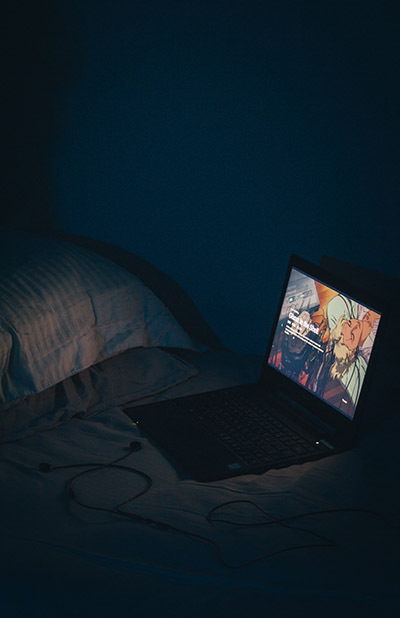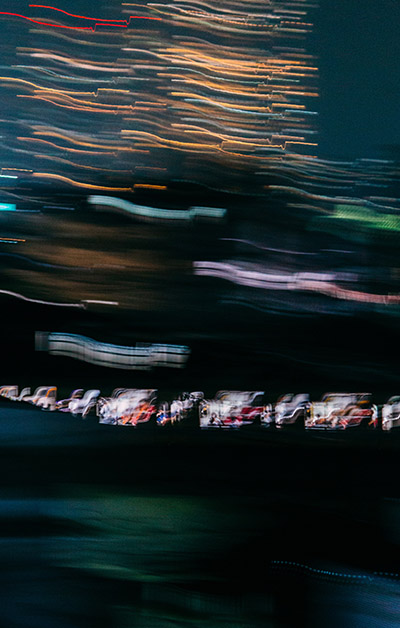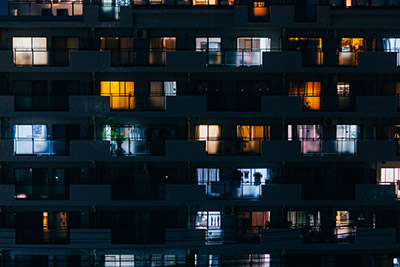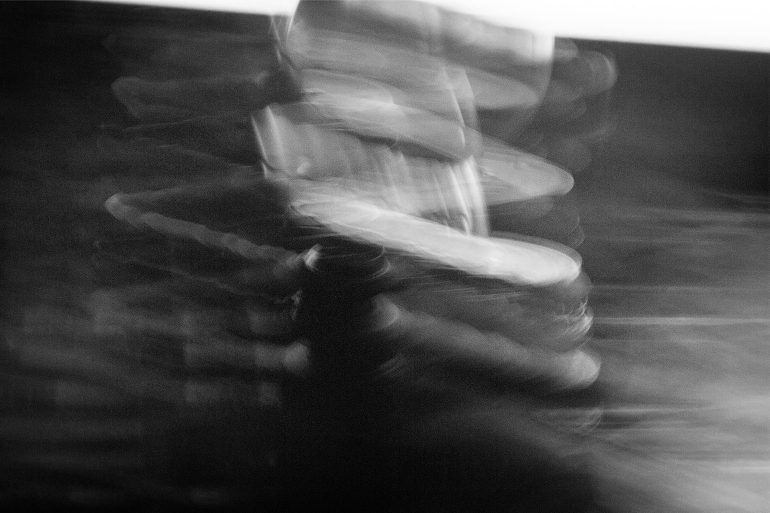Editor’s note: This letter was written by Michael Wolff in 2011 for Kyoorius Design Magazine. In the decade that followed, many of his fears have come to be true, and the word ‘content’ is recklessly labeled on almost everything. Yet, all aspects of this beautiful and intriguing letter remain relevant today.
Dear Reader,
First, I hope you’re well and happy. And second, I wonder if you’re as discontent with ‘content’ as I am.
‘Content’ is one of those impersonal words like ‘consumer’ or ‘diet’. I think it means the stuff that we watch; read; consume; connect with; think about; know about; and talk about.
It’s quite a puzzling word.

‘Contents’ used to mean a list of what you might find in a book, and content meant that you were feeling calm and happy with life. Now, aside from its uses meaning media, it’s more likely to be used by a medic to describe what’s in your stomach if you’re being examined in a postmortem, or by airport security to describe what’s in your suitcase. In the world of media it’s used to describe what’s published or broadcast. But whose is it? Is it intellectual content already in my mind, or is it something that someone has the rights to and wants to put into my mind? Where does it live? For every programme broadcast there are billions of different ways in which people see it. What one person writes is not what another reads. What one person says is not what another hears. So whose content is it?
It’s now 11.30, on Bank Holiday Monday, the 3rd of January 2011. Three things, or bits or bytes of content, have already agitated my brain during the last 24 hours, and have lodged there. I’ve turned each one of them into ‘content’ inside me — they’ve become some of my own ‘content’ of the day.
There’s far, far too much to know, so sometimes you have to get out of the shower of ‘content’. It’s a shower that can pour endless knowledge, information and drama over us, from billions of tiny nozzles, all the time.
The first was on Woman’s Hour, live on BBC Radio 4. I listened to a discussion that Jane Garvey had with Susan Maushart about her book, The Winter of our Disconnect. Susan had pulled the plug on all the screens in her home for six months. She described the radical effect that this had on her family. It seemed to me that it had ended the isolated and solitary world in which her family members had come to live with their own screens and iPhones, and in which they’d forgotten how to share music and life together. It enabled them to rediscover their own community as a family. Susan also described her relationship with her iPhone as a relationship of compelling, seemingly rich, but ultimately lonely dialogue with a world of virtual connection.
I was shocked as I realised how I too sometimes slide into a kind of sensual solitude, sometimes sharing my discoveries and experiences with others, nearly always after the event, and often forgetting what I’ve seen or heard altogether. There’s far, far too much to know, so sometimes you have to get out of the shower of ‘content’. It’s a shower that can pour endless knowledge, information and drama over us, from billions of tiny nozzles, all the time.
I can easily stop reading a boring book or walk away from a film or play, if I dislike watching it. Why do I find it harder to stop watching almost anything on television, or listening to almost anything on the radio?
Is the news really the news, or has it become a kind of editorialised series of press releases? Why can I feel so easily interested and almost addicted to the stories selected to be the news? Stories that often start and vanish with no explanation. Sometimes these are of global importance, sometimes they’re of astonishing triviality.
I can easily stop reading a boring book or walk away from a film or play, if I dislike watching it. Why do I find it harder to stop watching almost anything on television, or listening to almost anything on the radio?
If this is ‘content’, then we should shun it. But I didn’t.
For me the most distressing things on television, probably in my lifetime, were the two episodes on the first days of the Iraq wars. Before the invasion we saw Desert Cloud, with its own logo and music. And then we saw Desert Storm with another set of logos and music.
Both seemed like episodes of a poorly branded commercial TV series — a profoundly tragic, and possibly criminal war, reduced to an impersonal and sententious soap opera. If this is ‘content’, then we should shun it. But I didn’t.
I watched this grotesque ‘quasi-series’, just as millions of Americans and others did, somehow immune to the reality of the terror that was actually taking place.
Apart from eating and sleeping, dreaming, making love and doing whatever we do called work, this research implied that there doesn’t seem to be much else to life other than watching TV and its ‘content’, and then talking about it.
The second thing that agitated my brain was some research commissioned by Freesat, and carried out by Exeter University. I was shocked at the increase in the number of hours we in the UK spend watching TV.
I was interested in the different kinds of stuff we choose to watch, and surprised at the amount of time we spend talking to others about what we’ve seen. It doesn’t seem to leave much time for anything else. Apart from eating and sleeping, dreaming, making love and doing whatever we do called work, this research implied that there doesn’t seem to be much else to life other than watching TV and its ‘content’, and then talking about it.

The third, and by far the most satisfying thing that agitated my brain in the last 24 hours, was seeing Humphrey Bogart and Lauren Bacall in a marvellous movie — The Big Sleep, at the National Film Theatre, with my daughter. Raymond Chandler’s story and William Faulkner’s screenplay are extraordinarily brisk and finely tuned.
For me it’s only with friends that ‘content’ becomes valuable.
The whole thing is a feast of talent, wit and style. Sharing this with my daughter, who often shares films with me, was a delight.
Even though I know that so much of my life is, like anyone else’s, ultimately experienced alone, I realised just how much I value the helpless laughter and great excitements, and even unexpected fears and other kinds of adventures that I have with friends. For me it’s only with friends that ‘content’ becomes valuable.
The things I think I know are all needless weight, unless I can use them to be useful to other people. Appreciating great art, like cave paintings or the work of great actors and artists, writers, poets and musicians, is only useful to me when it enriches my life and my relationships with others.
Many more people seem to prefer looking back at a wildly romanticised past rather than facing some of the more shameful realities of the present.
These days the quality of many films from around the world is extraordinary. The talent in cinema now seems to me to outstrip the talent in any other form of art. But for me it’s always more powerful when it’s shared with friends.
On television Witness make exceptional films. Their call to action: “See it. Film it. Change it.” is compelling and, as far as I know, their documentaries are only shown on Al Jazeera. But as moving and as important as I think all the Witness films are, they represent a minute fraction of what television stations put in front of our faces. Many more people seem to prefer looking back at a wildly romanticised past rather than facing some of the more shameful realities of the present.
When I read books, always in isolation, I feel both the excitement that great writing stirs in me and, at the same time, the claustrophobia of solitude. I’m always bursting to share what moves me.
After completing it, I’m left with the frustrating feeling that I don’t really know how to know people. I know better how to see them as ‘content’.
Just as with learning, if it can change and deepen my ability to relate to others, then I’m enriched and changed by it. Reading Gabriel García Marquez’s great novel Love in the Time of Cholera (as I often do) is always a transformative experience for me.
That someone else in the world recognises glass windows that smell like soup or vice-versa is wonderful. More importantly, the relationships that this book reveals and describes are rich and intimate. The whole book remains a moving and profound inspiration to me. After completing it, I’m left with the frustrating feeling that I don’t really know how to know people. I know better how to see them as ‘content’.
Sometimes you choose precisely what you eat, and sometimes you accept the hospitality of others without judgement or discrimination. It’s the same with ‘content’. Sometime you choose what you’re interested in and sometimes you join in with someone else’s interests.
Choosing your own intellectual menu in private has become a kind of technology-driven pandemic. It’s making social life anti-social.
I can’t remember why I watched The Sopranos. Did I choose it or did someone share it with me? Did I decide it was a masterpiece or did I agree with someone else’s point of view? It was the same with The Simpsons and Dr. Katz and probably the same with everything. It’s only through sociability that content brings value into my life. On reflection I do believe that all those three are masterpieces. And more recently so is The Honourable Woman.
Choosing your own intellectual menu in private has become a kind of technology-driven pandemic. It’s making social life anti-social. Pushing out into conversation with anyone, constantly opening my mind to other people’s tastes and influences is far more enriching for me than simply choosing what I like, because I already like it.
There’s so much to see and do and eat and read, how do you choose now, and how will you make your choices in the future?
It reminds me of not liking oysters for many years, before I’d even tasted them. It also reminds me of the people I misjudged at my first impression of them, who turned out to become my greatest friends. That moment when I decide that I’m really not interested in a programme or a film or a book, before I’ve seen them, is a kind of self-denial that diminishes me. The price of missing a miracle is too high. Life is a dance, no ‘right’ steps. Taste what you’re offered fearlessly and be willing to dance.

I think it’s better to trust your open mind than to trust your judgement — a judgement that can only have been created from your past.
There’s so much to see and do and eat and read, how do you choose now, and how will you make your choices in the future?
For me, now, I’m interested in everything, so I don’t do a lot of choosing. I listen to recommendations and often find myself with a programme or a book or a film or a conversation and then see what happens and what I feel.
Will we become so obsessed with our interactive gadgets that we lose interest in anything other than being glued to their unlimited ‘content’?
As for what I’ll choose to do or watch in the future, I think it’s like any aspect of the future, no one really knows what will happen, what technology will bring, or what kind of content there will be to choose from, even five years from now. All we really know for sure is that our planet will be warmer.
Will we all be able to have numerous unshiny screens in our homes on which we can choose to display perfect digital reproductions of great paintings from any of the world’s collections?
Will Internet daters use full size floor to ceiling screens on which they can have virtual speed dating, liberating them into a wider idea of social life and relationships? Does WikiLeaks spawn many new sites that use existing private technology publicly, and bring about the irreversible end of privacy?
Will a new activism through social media enable us to curb corporate power and give us political structures that actually work for us?
Will there be a new generation of ‘unembedded’ journalists who bring an open mind to our media?
Will we become so obsessed with our interactive gadgets that we lose interest in anything other than being glued to their unlimited ‘content’?
I hope that many of us will want to turn down the volume on our current overwhelming ‘content’, without losing the richness that education, creativity and enlightenment bring.
Will we lead social lives or will we pseudo-socialise watching other people’s lives in TV and film series that become more and more intimate, and in which we can participate in the details and the outcomes?
Will ‘content’ transform education and free humanity from being taught that our future is simply an extrapolation of our past?
Will there be an effective backlash against the globalisation of ‘content’?
Will future media, with a new quality of integrity, change us and enable us to change how politics, business and work are transacted throughout the world to benefit all people and eliminate conflict and poverty?
Will our variety of nations, cultures, languages and currency endure, or will technology, ‘content’ and our potential connection with other planets, turn us into a single peaceful and interdependent humanity?
I hope that many of us will want to turn down the volume on our current overwhelming ‘content’, without losing the richness that education, creativity and enlightenment bring.
I hope that many more people will want to focus on their personal fulfilment and on the enrichment of their own lives with their families, colleagues and friends.
Most of all, I hope that you and I spend less time sitting down, watching mass-produced ‘content’ on a variety of devices in private, and more time talking and walking and being together, making our own ‘content’ and contentment.
Till the next issue,

***
Michael Wolff is the founder at Michael Wolff & Co. in the UK. Recognised as one of the world’s most experienced practitioners in establishing corporate identities and their resulting brands, Michael’s body of work has spanned more than 50 years. He enjoys encountering situations where he doesn’t know what to do or think. That’s when he needs, and so far, can count on, his creativity. Most of all, he enjoys enduring friendships, new friends and ideas that bring enjoyment, enrichment and new possibilities to the world.

